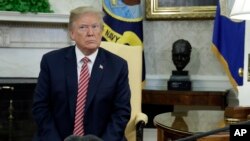Striking Syria with missiles is one option U.S. President Donald Trump is considering to retaliate for the latest alleged chemical attack blamed on Syria's government forces, according to the White House.
"Just because he does one thing doesn't mean he can't do a number of other actions as well," White House press secretary Sarah Huckabee Sanders told reporters Wednesday afternoon, repeatedly stating that "all options are on the table."
A robust, U.S.-led retaliatory military response is expected within days, according to officials and analysts in Washington.
WATCH: White House Says Options on Syria Still Being Considered
U.S. Secretary of Defense Jim Mattis was at the White House on Wednesday as Vice President Mike Pence convened the president's national security team for a meeting to contemplate the latest use of force against Syrian President Bashar al-Assad.
Mattis, earlier in the day, said that while intelligence about the attack in Syria was still being assessed, "we stand ready to provide military options if they're appropriate as the president determined."
After Russia's ambassador to Lebanon said Russian forces would shoot down any missiles fired at Syria, Trump said on Twitter that the Russians should be ready, "because they will be coming."
The Kremlin has called on all parties involved in Syria to refrain from actions that could destabilize the region.
Meanwhile, Russia's military, which had deployed its troops to Douma, the site of Saturday's suspected chemical attack that killed at least 40 people and sickened hundreds, said early Thursday that the Syrian government is now in control of the town.
Asked whether Russia was now regarded as an enemy, Huckabee Sanders demurred, saying "we certainly think they've proven to be a bad actor," and noting that Moscow had "guaranteed that the use of chemical weapons by Syria would not happen again. They failed at that."
More than 2,000 U.S. troops are in Syria, where a U.S.-led coalition has launched thousands of airstrikes — mostly against Islamic State members and other extremists.
The USS Harry S. Truman Carrier Strike Group, with about 6,500 sailors, departed from Norfolk, Virginia, on Wednesday for what the U.S. Navy termed a routine deployment to Europe and the Middle East. A Navy guided missile destroyer, the Donald Cook, left Cyprus on Monday in the Mediterranean Sea.
Tomahawk missiles
The Cook and the USS Porter, on April 7 last year, together launched 59 Tomahawk cruise missiles from the Mediterranean at Syria's Shayrat airbase in response to a chemical attack three days prior that killed at least 74 people and sickened hundreds.
The Porter is also in the U.S. 6th Fleet area of operations, which includes the Mediterranean.
Last year's attack ordered by Trump "was neither operationally nor strategically successful," Senate Foreign Relations Committee member Edward Markey said Wednesday.
The Massachusetts Democrat said that while Assad's barbaric use of chemical weapons must never again occur, Trump "must come to Congress for authorization" prior to another military operation against Syria.
"Obviously, the administration will follow whatever laws and regulations are necessary for any actions that we take," Huckabee Sanders said in response to a question about this from VOA. "Because we haven't laid out any specific actions that we plan to take, I can't tell you exactly what needs we would have to go to Congress with."
Analysts predicted Trump's response would be heftier than his April 2017 missile strike.
"Nonetheless, however big the strike package or alliance, it is unlikely to significantly affect Assad's calculus," according to Tobias Schneider, a research fellow at the Global Public Policy Institute in Berlin.
'Significant risk of escalation'
"Any attack large enough to cow Assad would carry significant risk of escalation," Schneider, who studies chemical weapons use in Syria, told VOA. "Russia can swallow a limited, slap-on-the-wrist kind of strike like last year, but it won't easily tolerate any action that seriously undermines its gains in Syria."
Syria and Russia, according to Schneider, "could choose to retaliate by making life harder for Americans deployed on the ground and in the air across the country's Northeast."
Trump — who canceled a Latin America trip to focus on Syria — has spoken in recent days with his British and French counterparts to coordinate action.
British Prime Minister Theresa May, without seeking parliamentary approval, is ready to give the go-ahead for the United Kingdom to take part in the military action, according to the BBC.
British submarines have been ordered to move within range of Syria, according to The Daily Telegraph of London.
The Organization for the Prohibition of Chemical Weapons, which coordinates its activities with the United Nations, is to send a team to investigate the incident, but it was uncertain whether it would arrive before a military response began.
Russia, at the U.N. Security Council on Tuesday, vetoed a U.S.-drafted plan that would have set up a commission to investigate and assign blame for the chemical weapons attack.
VOA's Jeff Seldin contributed to this report.















